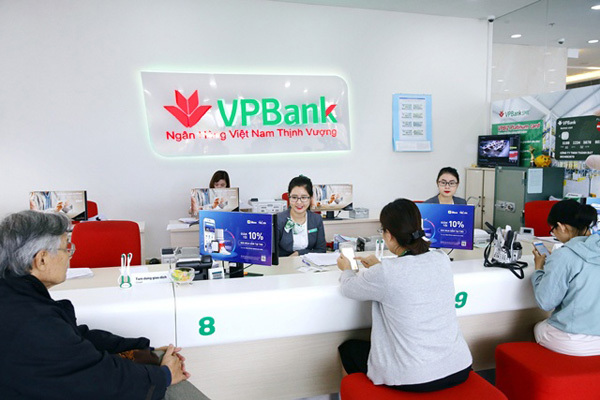 |
| Banks in charter capital hikes to add momentum. -- Illustration photo |
The State Bank of Vietnam (SBV) last week allowed Kienlongbank to increase its maximum charter capital to about $159 million by issuing shares to pay dividends to existing shareholders.
Besides this, the central bank has approved Vietnam Maritime Commercial Joint Stock Bank (MSB) to raise its charter capital by over $153 million to about $664 million through stock issuances.
A fortnight ago, VPBank’s shareholders approved an increase in the bank’s charter capital by issuing shares from its investment and reserve funds to supplement capital.
Accordingly, VPBank would issue about 1.97 billion shares to existing shareholders, equivalent to 80 per cent of the bank’s outstanding shares.
After successful issuance, VPBank’s charter capital will increase to nearly $2 billion. The bank aims to complete all procedures in the third or fourth quarter of this year and secure the highest charter capital in the system, surpassing other lenders such as ACB, MB, Agribank, Techcombank, Vietcombank, and BIDV.
In 2022, VPBank is set to triple its capital to around $3.26 billion to become the largest lender in Vietnam.
“Besides this capital hike, VPBank has been looking for strategic shareholders since 2019 and hopes to get it done by the end of 2021,” said Nguyen Anh Tung, analyst at KB Securities. “The bank’s move to reduce the maximum foreign ownership to 15 per cent is considered a step to pave the way for new strategic shareholders,” Tung added. “However, the spread of the coronavirus may slow down progress because negotiations are affected by short-term risks, while VPBank does not have to complete the deal in a hurry.”
In July, SeABank got the nod from the SBV to increase its maximum capital by over $117 million, thus boosting its total charter capital to approximately $643 million.
“The fresh capital would help us leverage our capacity, expand our operating network, diversify our services, and advance in this competitive environment,” a SeABank representative told VIR.
In June, LienVietPostBank also increased its charter capital to a good $523 million, while OCB would expand its operational efficiency thanks to the fresh capital of over $119 million by issuing nearly 274 million shares, with a dividend rate of 25 per cent.
Many other lenders also plan to strengthen their capital buffer through share issuance. VietinBank is to raise capital by 29 per cent to $2.1 billion by paying dividends in shares, while BAC A BANK, OCB, and TPBank also follow suit.
Economist Nguyen Tri Hieu believed, “Capital increases would also help banks have more reserves to cope with soured loans which are on the upward trajectory due to the outbreak.”
Likewise, some foreign-invested banks are also ramping up their presence in the country by adopting digitally-enabled approaches across their operations and adding more funds.
Last week, UOB Vietnam, the local franchise of Singapore-headquartered UOB, was approved to reinforce its capital from $130.4 million to $217.4 million.
The SBV required UOB Vietnam to be responsible in increasing charter capital in accordance with current law.
In late August, Standard Chartered Vietnam was also approved to increase its charter capital to around $300 million from $182.6 million by the SBV. This follows previous increases made in 2018 with around $49 million and in 2019 with $100 million.
CIMB Vietnam was allowed to raise its fund from around $150 million to over $160.43 million in July. Over the past two years, CIMB Vietnam has continuously increased its charter capital, reflecting its long-term commitment in the country.
Thomson Fam Siew Kat, CEO of CIMB Vietnam, said, “Vietnam is deemed as one of the most dynamic finance and banking markets in Asia, as well as one of our priority markets. The increase of charter capital will facilitate CMIB to expand its investment, focusing on providing Vietnamese customers with modern finance and banking products, as well as improving their experiences with high-quality products and services. CIMB has also signed partnership agreements with some strong partners in Vietnam to complete the digital banking ecosystem.”
According to VNDIRECT, the domestic banking system was supplemented with more than $1.4 billion of additional charter capital in 2020. By the end of last year, 18 Vietnamese banks recorded charter capital of over $434 million.
Meanwhile, by 2023 all banks must comply with the capital adequacy ratio in accordance with Basel II standards. Along with meeting these requirements, the capital increase would boost banks’ financial efficiency, as well as offer more medium and long-term funds to further roll out their activities.
Vietnam Report notes that there will be a capital hike competition in the banking group this year, when the registered capital increases by around $3.6 billion.
On the flip side, banks are issuing debt instruments, such as corporate bonds, to supplement their capital. This could explain the rationale behind an exodus of local lenders issuing corporate bonds in the past few months, such as VietinBank, VIB, and BIDV.
“The risk and reward profile of the banking sector is attractive now. One of key challenges is the longer-than-expected social distancing, or another new virus variant arising, both of which might hinder the back-to-normal of the economy,” VNDIRECT noted. “This could cause banks to register higher-than-expected loan losses provisioning and weaker-than-expected loan growth in 2021 and 2022. Another downside risk is that the net interest margin to contract could be heavier than expected following weak credit demand.”
Source: VIR

Foreign investors eye VN banking stocks
The stock market of Vietnam is bustling with banking and securities stocks as the backbone, as the potential of banking stocks is attracting the attention of foreign investors.

Bright prospects for bank stocks
Bank tickers will remain in the spotlight, with investors racing to capitalise on bright profit prospects.